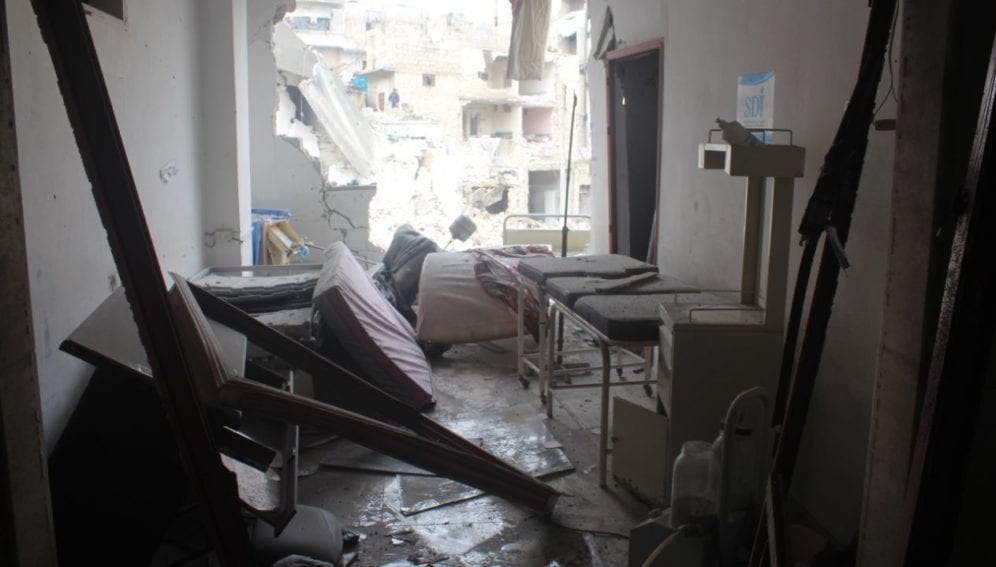By: Sonya Al-Ali
Send to a friend
The details you provide on this page will not be used to send unsolicited email, and will not be sold to a 3rd party. See privacy policy.
Fighting between the Assad regime and rebels has renewed in Idlib, the last opposition stronghold in the country. About half a million people have fled the province since the government launched air strikes in December.
About 70 of the 85 attacks on health facilities in Syria last year were in the north-west, the World Health Organization says. More than 50 medical facilities there had to suspend operations last month due to insecurity or threats of attack.
“Bombing has caused water contamination and ruined sanitation systems, turning the place into a host for diseases and pandemics,”
Mohammed Jassim, Early warning & response network manager – Syria Assistance Coordination Unit
Emad Zahran from the Idlib Health Directorate told SciDev.Net: “The situation is very bad in Idlib, where the southern rural part of the governorate is totally deprived of medical clinics, due to systematic bombing by Assad’s and Russia’s planes.”
Zahran said this included Ma'arat al-Nu'man Central Hospital, the largest in southern Idlib, and Al-Shami hospital in Ariha. Medical staff and civilians were killed in the Ariha attack.
“Damaged hospitals and lack of support mean that the sick or injured won’t be able to access health services, and will have to go long distances to seek services elsewhere; with the possibility of complications or death, as well as spreading infections to others,” he said.
The bodies of the dead remain in the open across Idlib, creating conditions in which infectious diseases can develop and spread.
Mohammed Jassim, the early warning alert and response network manager for Syria’s Assistance Coordination Unit, says: “Bombing has caused water contamination and ruined sanitation systems, turning the place into a host for diseases and pandemics.”
Jassim says more than 60,000 cases of Leishmaniasis have been recorded in the region, as well as hepatitis, typhoid, flu, and acute diarrhoea.
In northern rural Idlib, hospitals are at capacity treating patients who would otherwise have sought treatment in the damaged hospitals.
Medical staff are overworked and under physical and mental stress, while fearing they could be the next bombing target.
Civilians displaced by the fighting – 80% of whom are women and children – spoke to SciDev.Net from the camps where they have taken refuge.
Um Mostafa, from Ma'arat al-Nu'man, says her son was killed in a bombing attack. “After an air strike on the city, my boy got shrapnel in his head and doctors wanted to send him to Turkey for treatment, as resources in the local hospitals were insufficient,” she says. “However, he passed away before reaching Turkey.”
Ali Al-Aboud, who fled Saraqeb city for Haranbush in northern Idlib, says: “After moving to the camp, my two-year boy, who suffers asthma, got very sick due to the severe cold and dire living conditions.”He says they lack access to medical staff and services, and medication is scarce and expensive.
Internal displacement will likely continue to grow, putting further pressure on already overcrowded camps, and increasing the risk of infectious diseases spreading, the WHO says.
Humanitarian workers are concerned that the international community is ignoring the crisis.
“What is striking about this escalation is that the enormous humanitarian needs are being largely ignored by the international media and governments,” Rick Brennan, acting regional emergency director for the WHO’s Regional Office for the Eastern Mediterranean, says.
“North-west Syria represents one of the world’s most severe humanitarian crises, where civilians are suffering on an extraordinary level.”
This piece was produced by SciDev.Net’s Middle East & North Africa desk.














